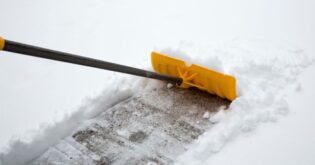Philadelphia Residents: Important Snow Removal Responsibilities
January 18, 2024 In light of the recent snow and ice accumulation seen throughout the Philadelphia area, now is certainly as good a time as any to revisit some important snow removal guidelines for city residents. Not only is it critical for businesses, property owners and tenants to ensure that they are complying with the city’s snow removal ordinances to avoid incurring a hefty fine (violations range from $50 to $300), but it is also essential in preventing unsuspecting individuals from sustaining avoidable – and sometimes very serious – slip and fall injuries that are more likely to occur in inclement weather conditions like these.
In light of the recent snow and ice accumulation seen throughout the Philadelphia area, now is certainly as good a time as any to revisit some important snow removal guidelines for city residents. Not only is it critical for businesses, property owners and tenants to ensure that they are complying with the city’s snow removal ordinances to avoid incurring a hefty fine (violations range from $50 to $300), but it is also essential in preventing unsuspecting individuals from sustaining avoidable – and sometimes very serious – slip and fall injuries that are more likely to occur in inclement weather conditions like these.
City Ordinances and Snow Removal Guidelines to Follow
While snow removal ordinances vary from location to location, a citywide ordinance in Philadelphia mandates that all homeowners, landlords, businesses, and that certain renters remove snow and clear a safe walking path from their sidewalks within six hours of a snow fall stopping. The path must be 36 inches wide unless the width of the pavement from an individual’s property line to the curb is smaller than that. In those cases, the pathway may be narrower, but it still must be a minimum of one foot wide so that people can safely navigate their way through it.
The Philadelphia Streets Department also recommends using a commercial salt or deicer to inhibit ice from accumulating on sidewalks, steps and other pathways. City officials also remind residents that it is illegal to remove snow from a sidewalk or from or around a vehicle and deposit it back onto a snowplowed street. Depositing snow in this way creates unnecessary hazards for pedestrians, drivers and passengers alike. Businesses, owners and renters who are responsible per Philadelphia ordinance should be sure to clear the following areas from snow and ice accumulation:
- Building entrances
- Driveways
- Sidewalks, including those that are adjacent to some businesses and/or walkways
- Parking lots
Slip and Fall Injuries
Slip and falls – whether they happen indoors or outdoors – can cause a variety of significant injuries for victims. Though these accidents can happen inside or outside, the Centers for Disease Control and Prevention (CDC) find that they are far more likely to happen during the winter months due to how hazardous weather conditions can be. According to the CDC, approximately 1 million people are injured from slipping and falling on snow or ice each year. About 17,000 of those falls are fatal. The agency finds that some of the most common slip and fall-related injuries that individuals sustain are:
- Contusions, lacerations, cuts and abrasions
- Broken bones
- Spinal cord injuries
- Dislocations
- Concussions and other types of traumatic brain injuries, or TBIs
- Torn ligaments, tendons and/or muscles
Since these incidents can happen indoors as well, it is a good idea to have a mat or rug in the entranceway of your home, apartment, or business so that people can dry off before entering the space. Business owners must also be sure to clearly label any wet or slippery floors in addition to cleaning them in a timely and reasonable manner. Some other effective ways to reduce risks of slipping and falling include:
- Walking extra carefully and slowly
- Keeping an eye out for spots of black ice and slippery entranceways
- Trying to keep your hands out of your pockets. It is also a good idea to avoid carrying anything so that if you do fall you have a better chance of catching yourself with your hands
- If possible, avoid walking on slippery curbs and uneven surfaces
- If you suspect that an area you are approaching may be slippery or icy, gently tap it with your foot before walking across it
Slip and falls are not the only dangerous accidents that increase in the colder months — motor vehicle accidents do, too. To reduce vehicular accident risks, Philadelphia legislation requires that car owners clean their vehicles off before operating them. Ensuring that your vehicle is cleaned off not only increases your own visibility, but it also protects pedestrians and other vehicles on the road from being hit by potentially deadly amounts of snow or ice that can fly off a moving vehicle.
If you or a loved one sustained injury in a slip and fall or weather-related car accident, someone at our firm can help. To learn more about filing a claim, contact a representative online now.
Philadelphia Premises Liability Lawyers at Galfand Berger, LLP, Representing Injured Victims Since 1947
If you have questions about filing a claim for injuries you sustained, contact the Philadelphia premises liability attorneys at Galfand Berger LLP today. Call us at 800-222-USWA (8792) or fill out our online form for a free consultation. Located in Philadelphia, Bethlehem, Lancaster, and Reading, we serve clients throughout New Jersey and Pennsylvania, including Allentown and Harrisburg.
 Google Screened
Google Screened
